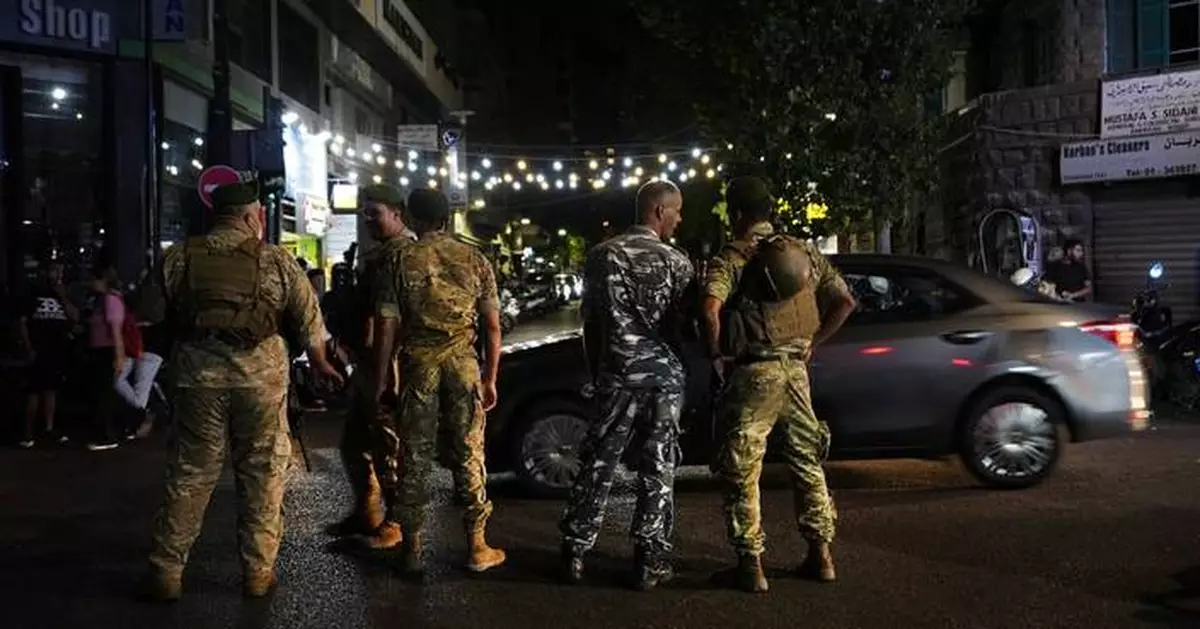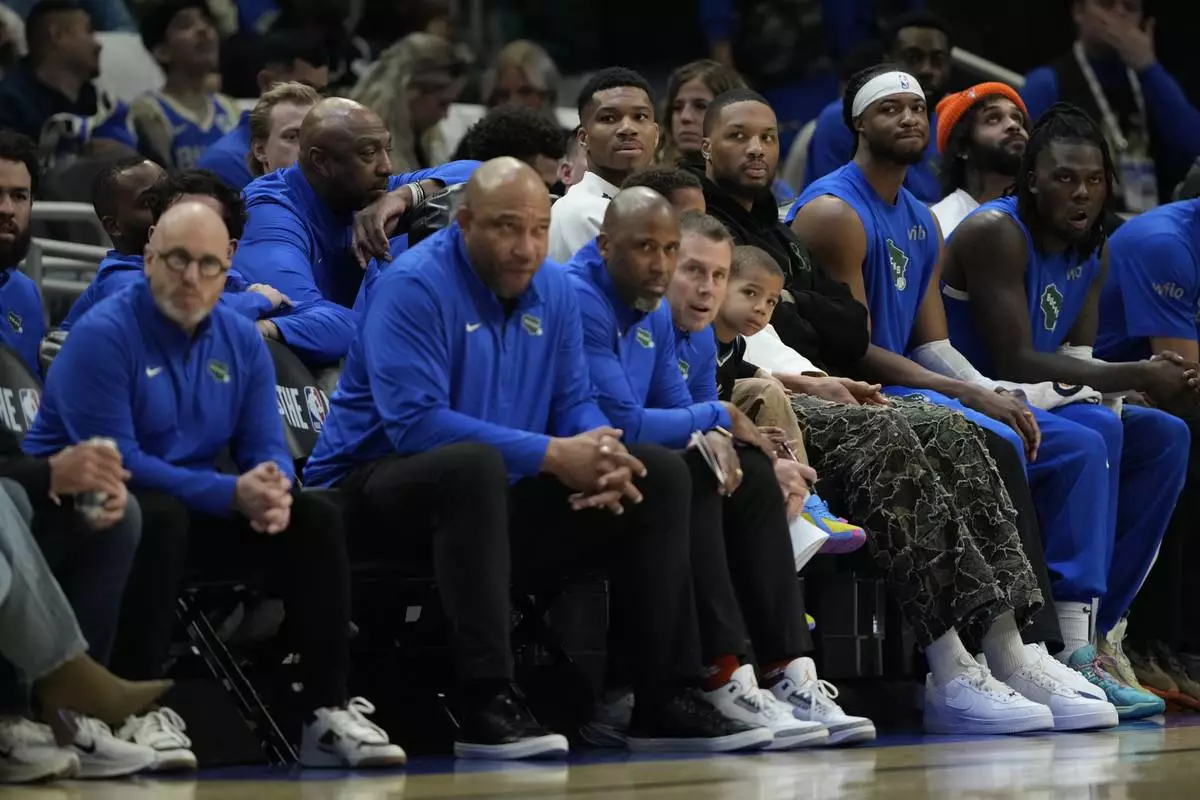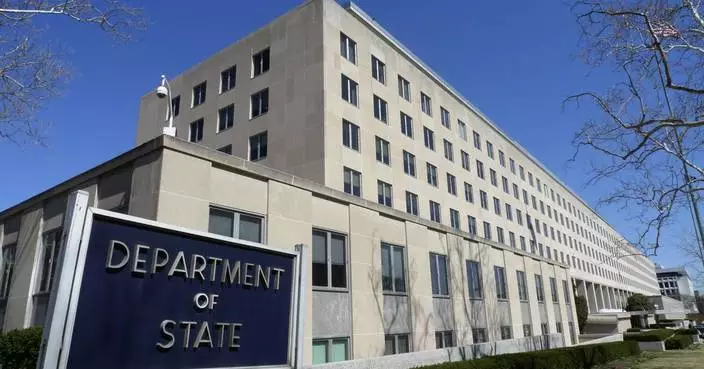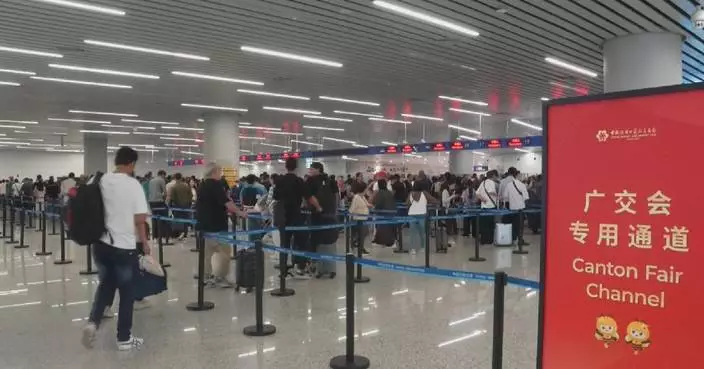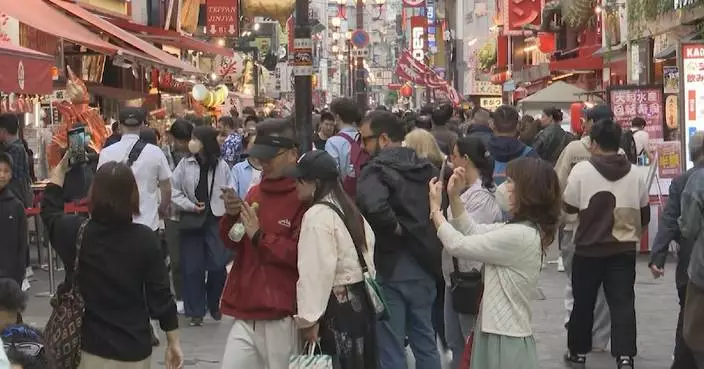BEIRUT (AP) — Walkie-talkies exploded in Beirut and other parts of Lebanon on Wednesday in a second wave of attacks targeting devices a day after pagers used by Hezbollah blew up, state media and officials for the militant group said. At least 20 people were killed and more than 450 wounded in the second wave, the Health Ministry said.
The attacks — which were widely believed to be carried out by Israel targeting Hezbollah but have also killed civilians — have hiked fears that the two sides' simmering conflict could escalate into all-out war.
Speaking to Israeli troops on Wednesday, Israeli Defense Minister Yoav Gallant said, “We are at the start of a new phase in the war — it requires courage, determination and perseverance.” He made no mention of the exploding devices but praised the work of Israel’s army and security agencies, saying “the results are very impressive.”
In Wednesday's attacks, several blasts were heard at a funeral in Beirut for three Hezbollah members and a child killed by exploding pagers the day before, according to Associated Press journalists at the scene. An AP photographer in the southern coastal city of Sidon saw a car and a mobile phone shop damaged after devices exploded inside of them. The state news agency reported home solar energy system blowing up in several locations, but experts cast doubt on whether those incidents were connected, saying they may have been coincidental accidents.
The new blasts hit a country still roiling with confusion and anger after Tuesday’s pager bombings, which killed at least 12 people, including two children, and wounded some 2,800 others.
The second wave also deepens concern over the potentially indiscriminate casualties caused in the attacks, in which hundreds of blasts went off wherever the holder of the pager happened to be — in homes, cars, at grocery stores and in cafes, often with family or bystanders nearby.
While the pagers were used by Hezbollah members, there was no guarantee who was holding the device at the time it was detonated. Also, many of the casualties were not Hezbollah fighters, but members of the group’s extensive civilian operations mainly serving Lebanon’s Shiite community.
At least two health workers were among those killed Tuesday. Doctors, nurses, paramedics, charity workers, teachers and office administrators work for Hezbollah-linked organizations, and an unknown number had pagers.
Mary Ellen O’Connell, a professor of law and international peace studies at the University of Notre Dame in Indiana, said booby-traps are banned under international law. "Weaponizing an object used by civilians is strictly prohibited,” she said.
The U.N. human rights chief, Volker Türk, called for an independent investigation into the mass explosions, saying, “The fear and terror unleashed is profound.”
The U.N. Security Council scheduled an emergency meeting on the explosions in Lebanon on Friday afternoon at the request of Algeria, the Arab representative on the powerful 15-member body.
Iran-backed Hezbollah — Lebanon's strongest armed force — has exchanged fire with Israel's military almost daily since Oct. 8, the day after a deadly Hamas-led assault in southern Israel triggered the war in Gaza. Since then, hundreds have been killed in strikes in Lebanon and dozens in Israel, while tens of thousands on each side of the border have been displaced. Hezbollah said its strikes are in support of its ally, Hamas.
Hezbollah announced three strikes on parts of northern Israel Wednesday, at least one of which took place after the latest round of explosions in Lebanon.
Israeli leaders have issued a series of warnings in recent weeks that they might increase operations against Hezbollah in Lebanon, saying they must stop the exchange of fire to allow people to return to homes near the border. Israel began moving more troops to its border with Lebanon on Wednesday as a precautionary measure, according to an official with knowledge of the movements who spoke on condition of anonymity because he was not authorized to speak to the media.
In his comments, Gallant said that after months of fighting Hamas in Gaza, “the center of gravity is shifting to the north by diverting resources and forces.”
As Prime Minister Benjamin Netanyahu huddled with top security officials at Israeli military headquarters in Tel Aviv, the country's army chief, Lt. Gen. Herzi Halevi, said plans have been drawn up for additional action against Hezbollah. Israeli media say the government has not yet decided whether to launch a major offensive in Lebanon.
Hezbollah’s leader, Hassan Nasrallah, is expected to deliver a major speech on Thursday.
Secretary of State Antony Blinken said the U.S. is still assessing how the attacks in Lebanon could affect efforts to negotiate a cease-fire in the Israel-Hamas war.
The pager bombings appeared to be a complex operation months in the making, with many experts believing Israel infiltrated the supply chain and rigged hundreds of pagers with explosives before they were imported to Lebanon. But little evidence has emerged so far.
Gold Apollo, a Taiwanese firm, said it authorized a Hungary-based company, BAC Consulting KFT, to use its name on devices delivered to Hezbollah. But a Hungarian government spokesman said Wednesday the pagers delivered to Hezbollah were never in Hungary and that BAC Consultants merely acted as an intermediary.
Hungarian national security services were cooperating with international partners, the Hungarian spokesman, Zoltán Kovács, posted Wednesday on X.
Wednesday's new bombings came as Lebanese were mourning the dead from the day before.
Two explosions went off at the edges of the funeral of two fighters, a young boy and a paramedic in southern Beirut. As ambulances screeched to the scene, the ceremony continued, with a senior Hezbollah official, Hashem Safieddine, telling mourners that Israel’s “aggression will face its special punishment.”
Israeli drones buzzed overhead – as they do often over Beirut and many parts of Lebanon – as thousands of mourners marched in a procession with the four coffins to a cemetery.
“We will not despair and we will not surrender. We will continue as long as blood circulates in our veins,” said one woman, who identified herself as Um Hussein, as she stood outside the cemetery with her four children.
In the village of Nabi Sheet in the Bekaa Valley, dozens gathered to mourn 9-year-old Fatima Abdullah, another victim of the pagers. Her mother, wearing black and donning a yellow Hezbollah scarf, wept alongside other women and children as they gathered around the little girl’s coffin before her burial.
This story has been updated to correct the age of one of the children killed. She was 9, not 8.
Spike reported from Budapest and Lai from Taipei, Taiwan. Associated Press journalists Abby Sewell and Kareem Chehayeb in Beirut; Simina Mistreanu in Taipei; Melanie Lidman and Josef Federman in Jerusalem; Zeke Miller in Washington; and Jon Gambrell in Dubai, United Arab Emirates, contributed to this report.
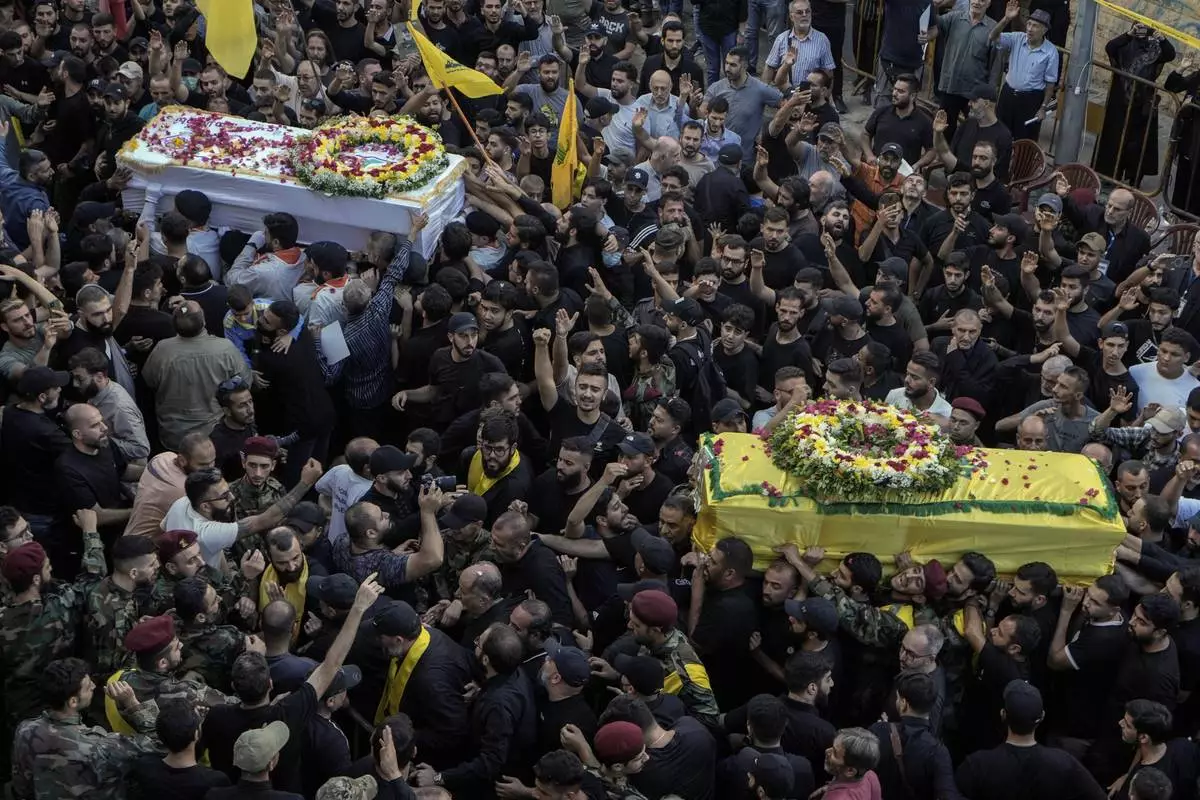
Mourners carry the coffins of victims who were killed Tuesday after their handheld pagers exploded, during their funeral procession in the southern suburb of Beirut, Lebanon, Wednesday, Sept. 18, 2024. (AP Photo/Bilal Hussein)
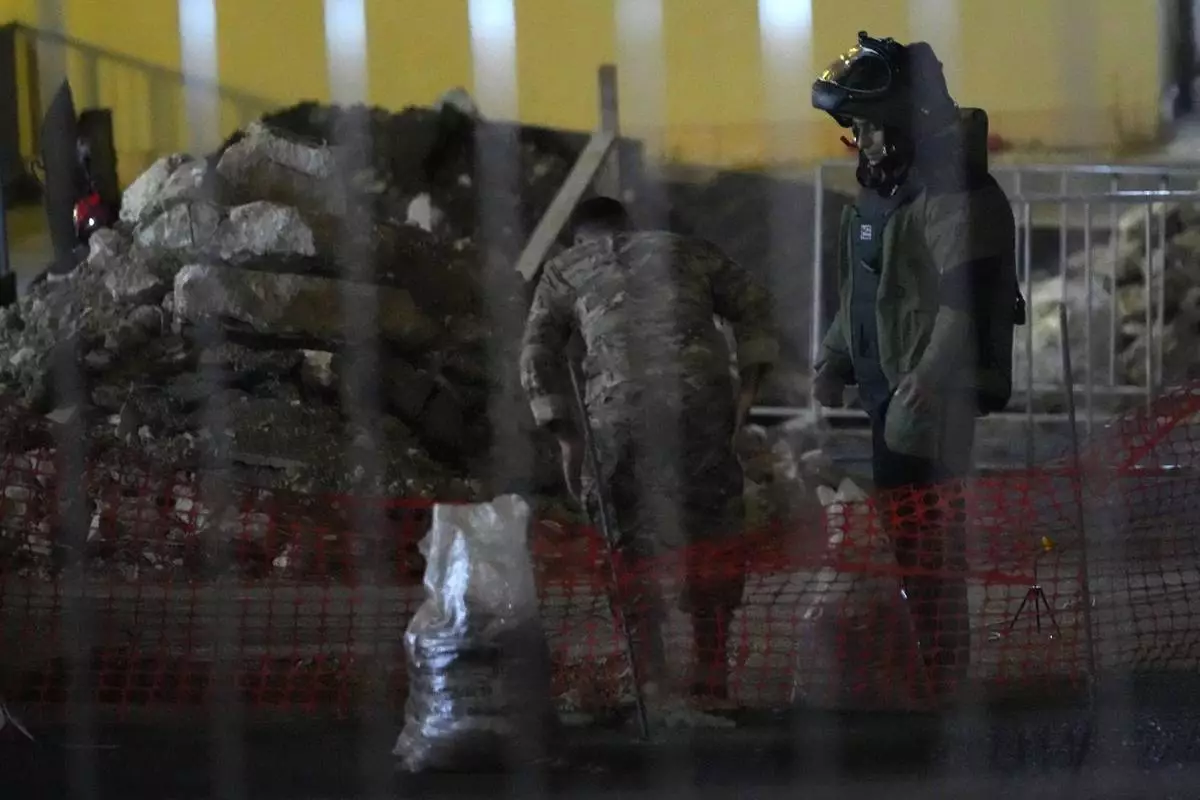
A Lebanese army bomb disposal specialist wearing a protective gear prepares, with his comrade, to detonate a walkie-talkie that was found at the parking of the American University Hospital, in Beirut, Lebanon, Wednesday, Sept. 18, 2024. (AP Photo/Hassan Ammar)
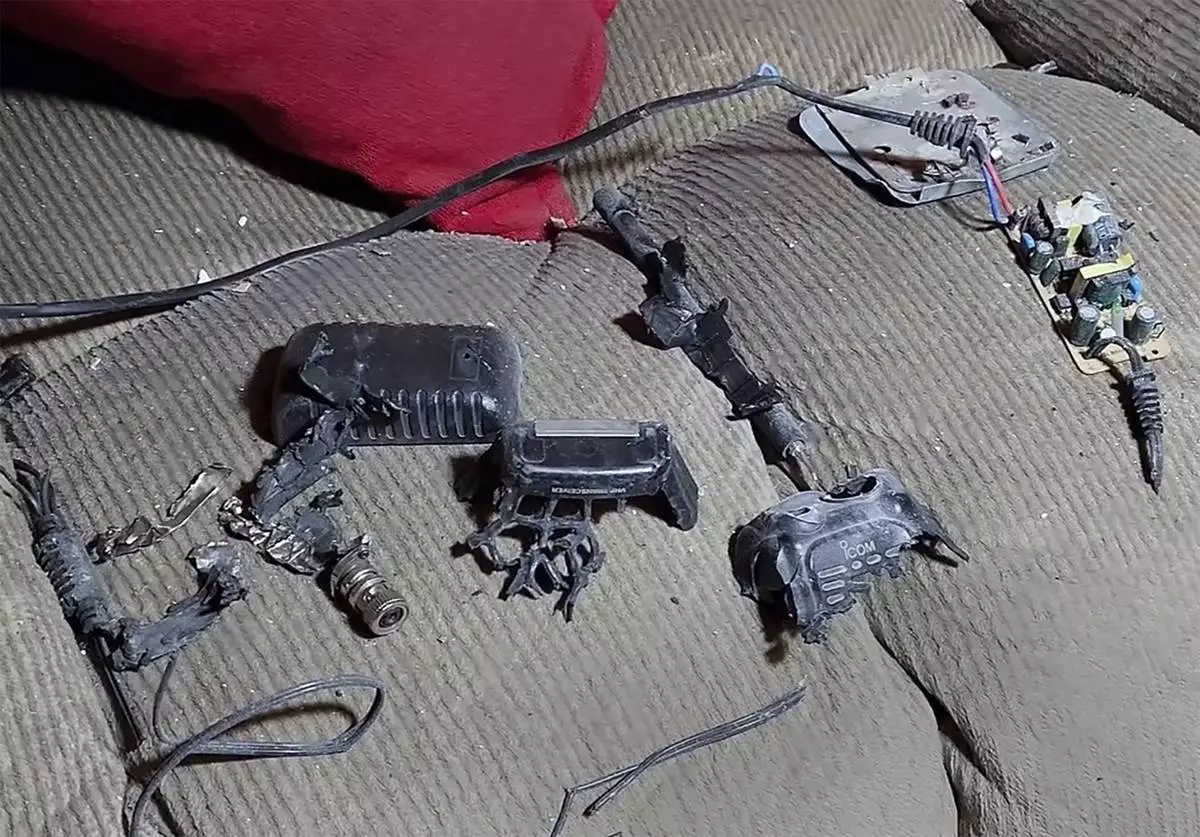
This video grab, shows a walkie-talkie that was exploded inside a house, in Baalbek, east Lebanon, Wednesday, Sept. 18, 2024. (AP Photo)
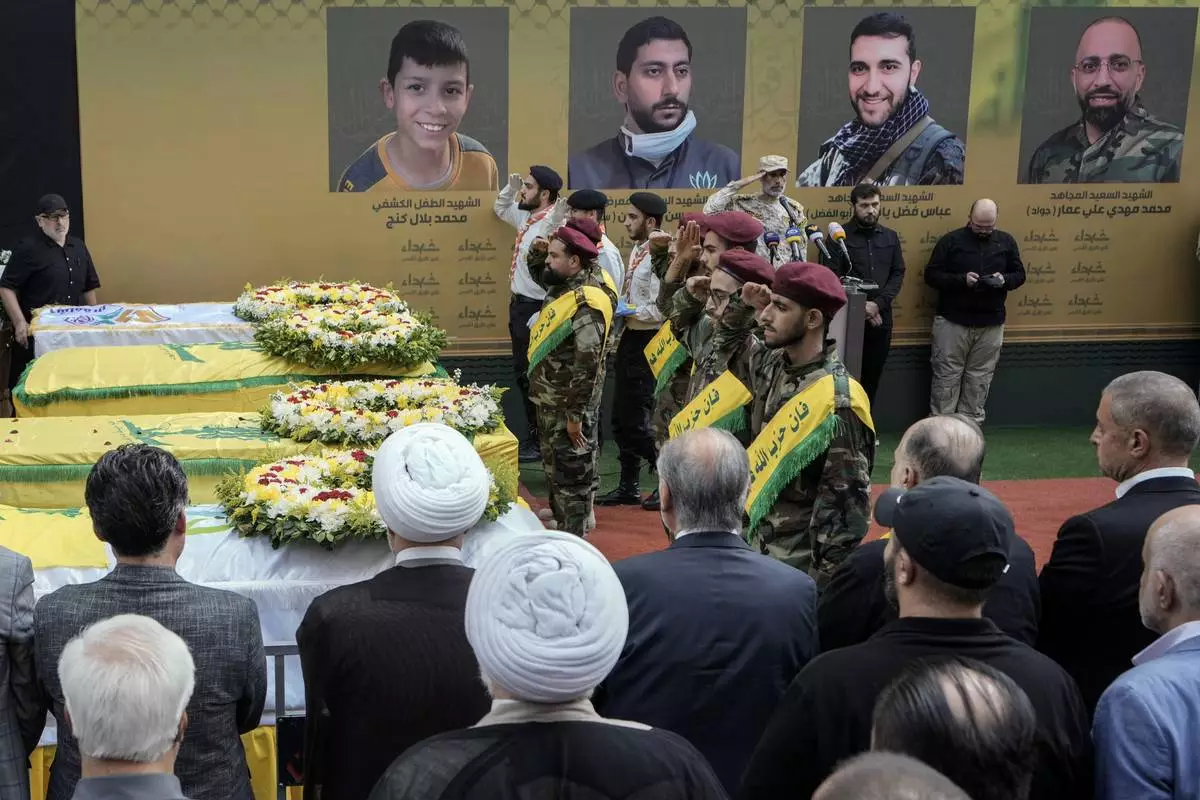
Hezbollah fighters salute as they stand next to the coffins of four victims who were killed Tuesday after their handheld pagers exploded, during their funeral procession in the southern suburb of Beirut, Lebanon, Wednesday, Sept. 18, 2024. (AP Photo/Bilal Hussein)
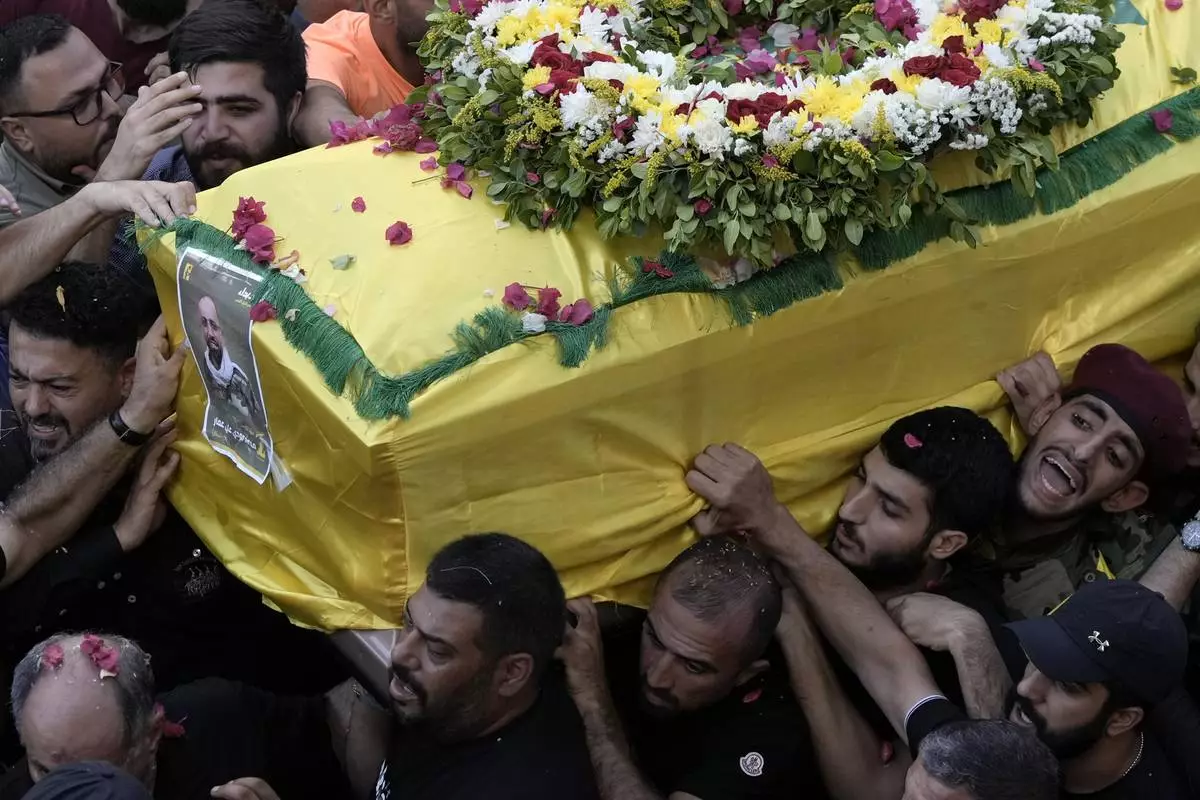
Hezbollah fighters carry one of the coffins of four fallen comrades who were killed Tuesday after their handheld pagers exploded, in the southern suburb of Beirut, Lebanon, Wednesday, Sept. 18, 2024. (AP Photo/Bilal Hussein)
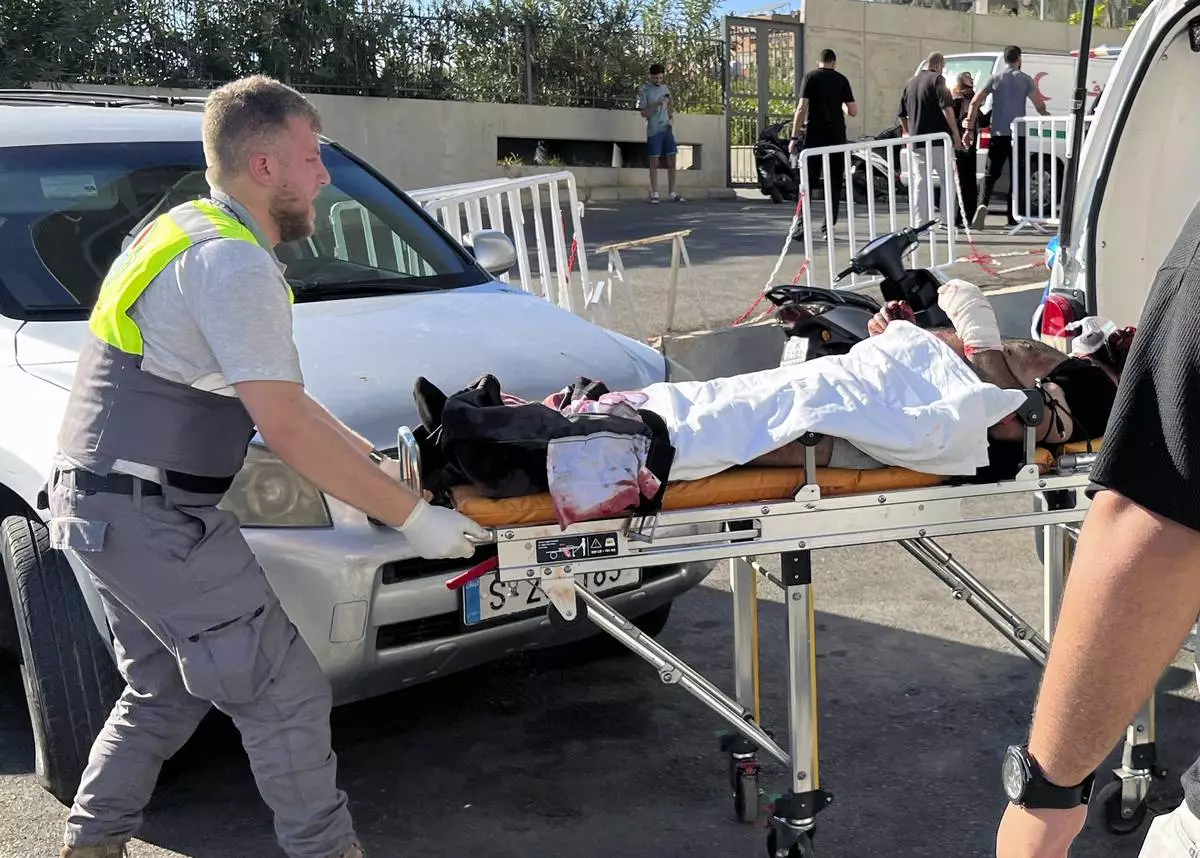
A Civil Defense first-responder carries a wounded man whose handheld pager exploded at al-Zahraa hospital in Beirut, Lebanon, Tuesday, Sept. 17, 2024. (AP Photo/Hussein Malla)
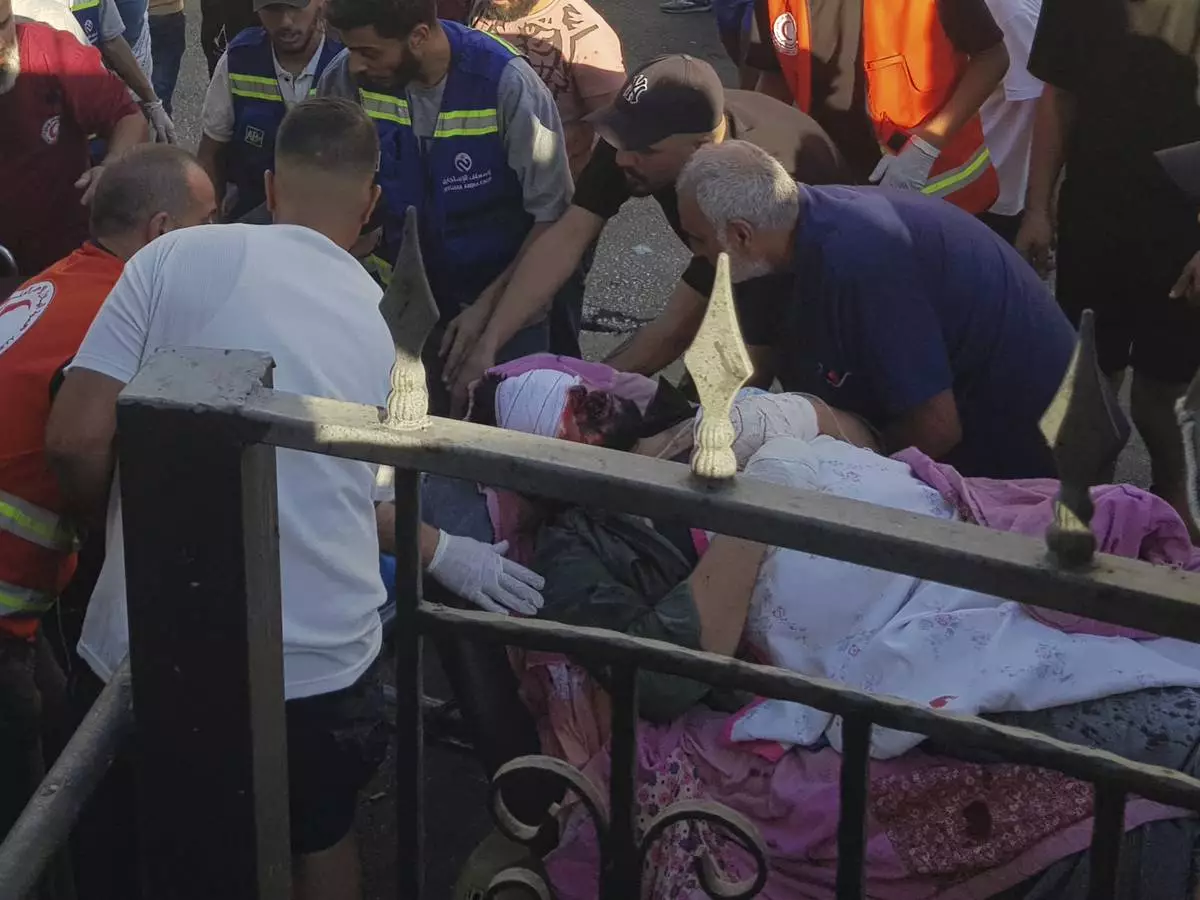
Civil Defense first-responders carry a man who was wounded after his handheld pager exploded, in the southern port city of Sidon, Lebanon, Tuesday, Sept. 17, 2024.(AP Photo)
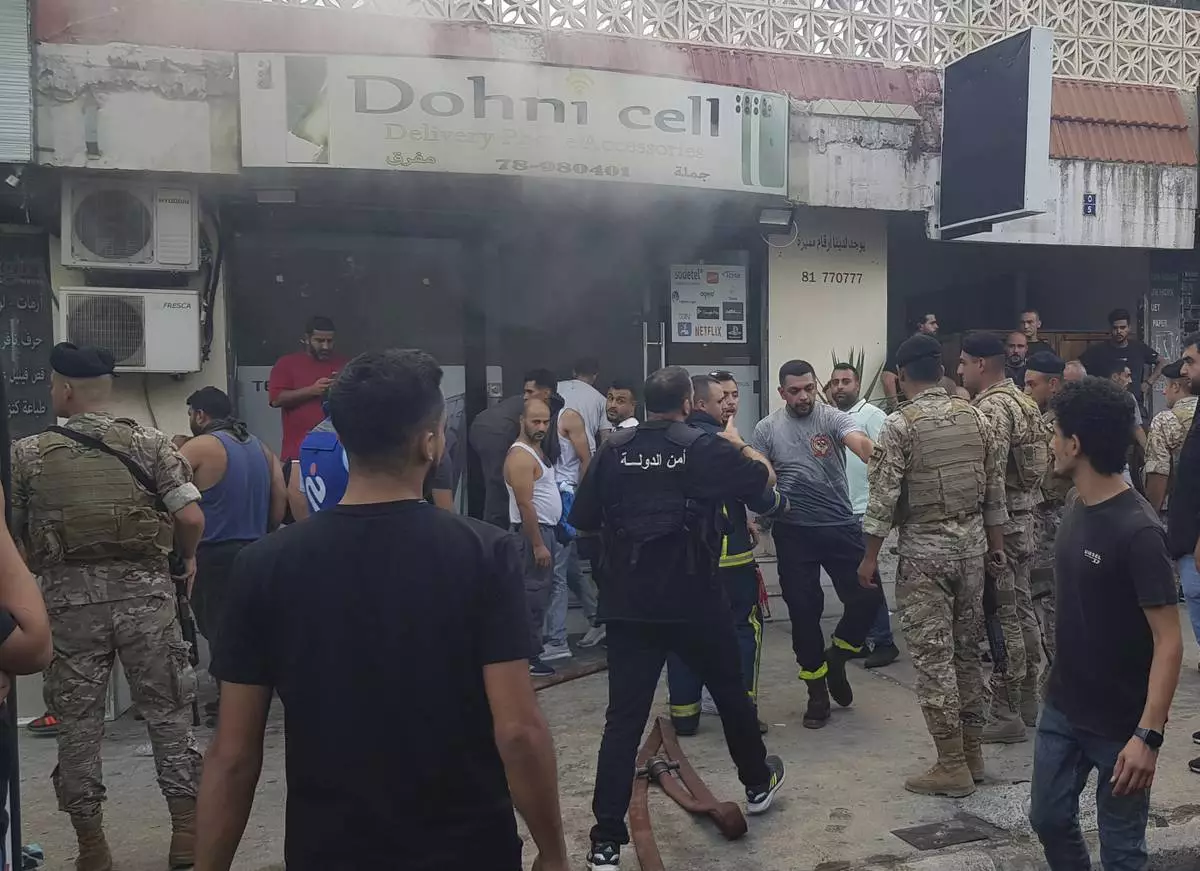
Lebanese soldiers and firefighters gather outside a mobile shop after what is believed to be the result of a walkie-talkie exploding inside it, in the southern port city of Sidon, Lebanon, Wednesday, Sept. 18, 2024. (AP Photo/Mohammed Zaatari)
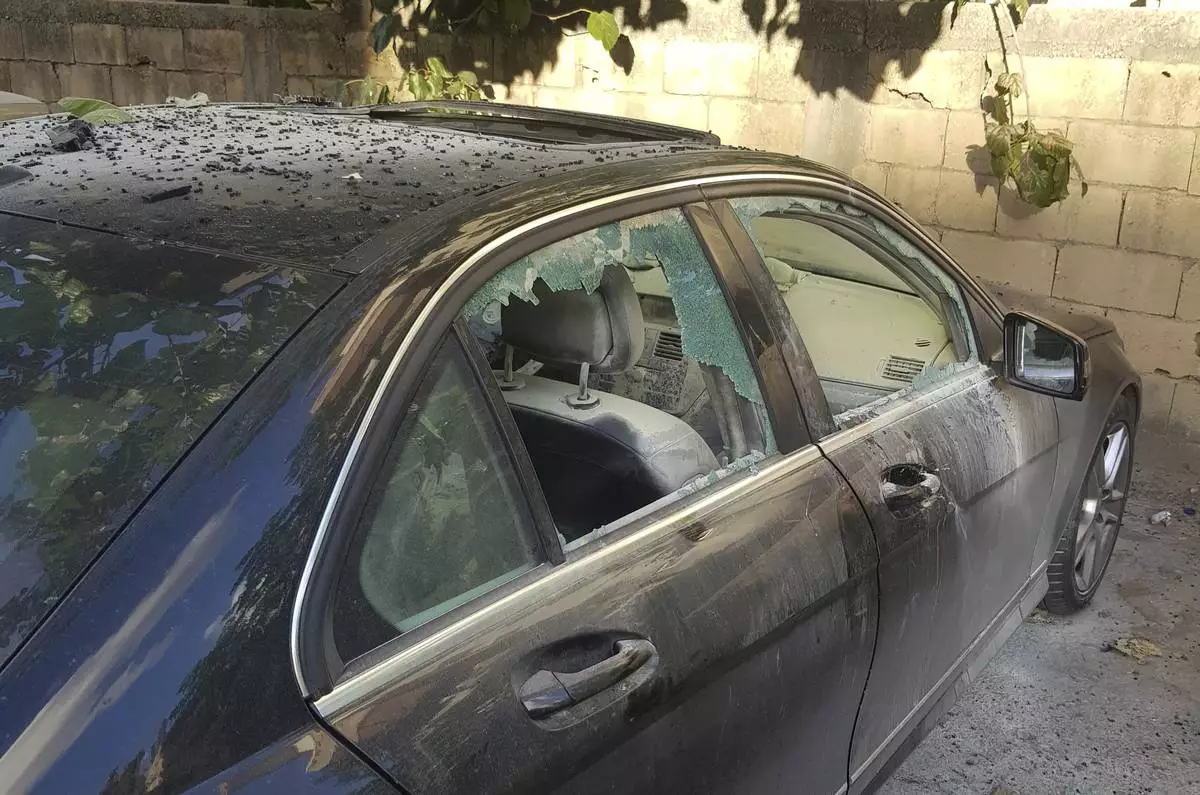
A partly damaged car after what is believed to be the result of a walkie-talkie exploding inside it, in the southern port city of Sidon, Lebanon, Wednesday, Sept. 18, 2024. (AP Photo/Mohammed Zaatari)
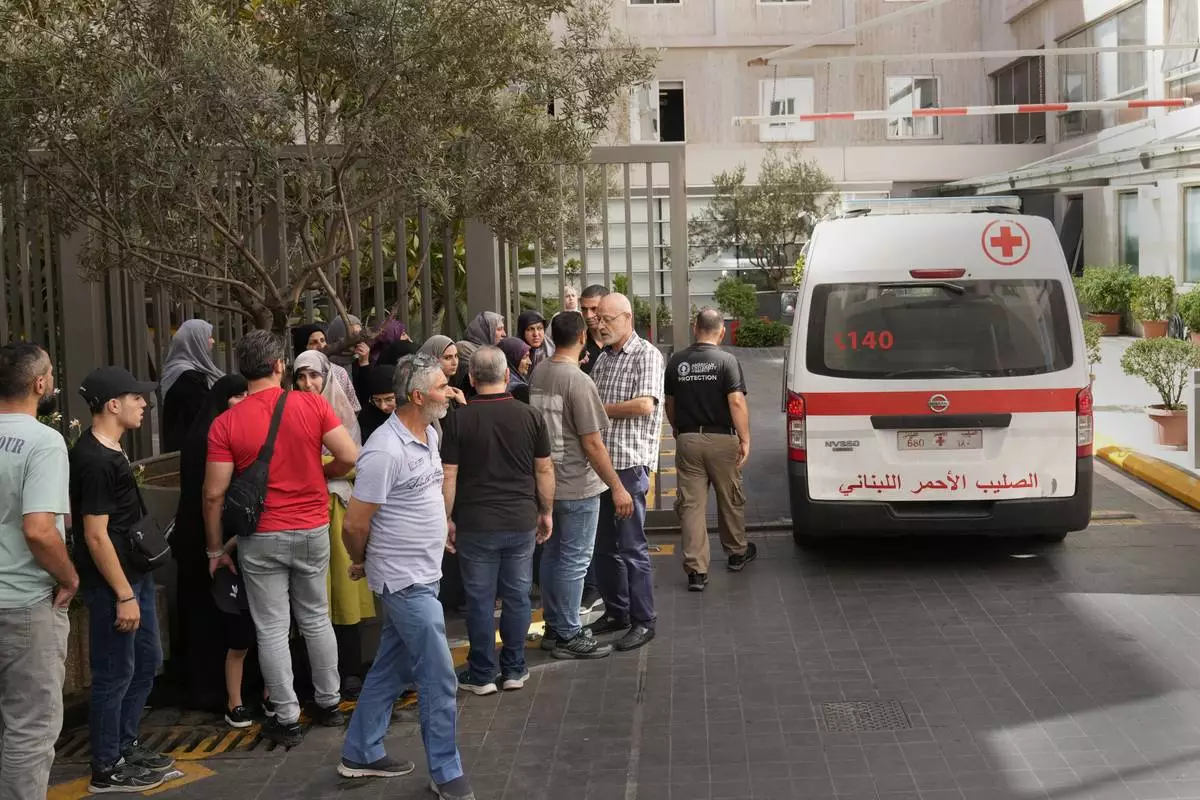
CORRECTS DAY TO TUESDAY WHEN INJURED Lebanese Red Cross ambulance passes next of the families of victims who were injured on Tuesday by their exploding handheld pagers, at the emergency entrance of the American University hospital, in Beirut, Lebanon, Wednesday, Sept. 18, 2024. (AP Photo/Hussein Malla)
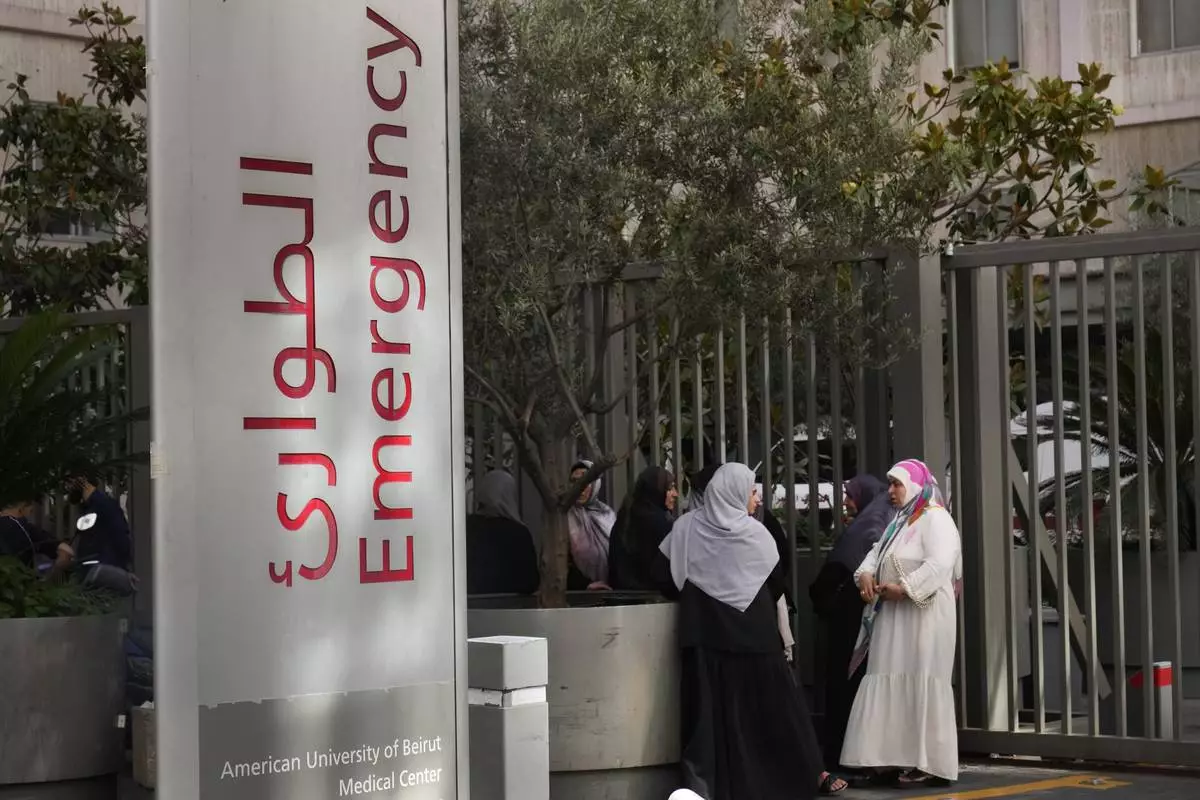
CORRECTS DAY TO TUESDAY WHEN INJURED Families of victims who were injured on Tuesday by their exploding handheld pagers, wait at the emergency entrance of the American University hospital, in Beirut, Lebanon, Wednesday, Sept. 18, 2024. (AP Photo/Hussein Malla)
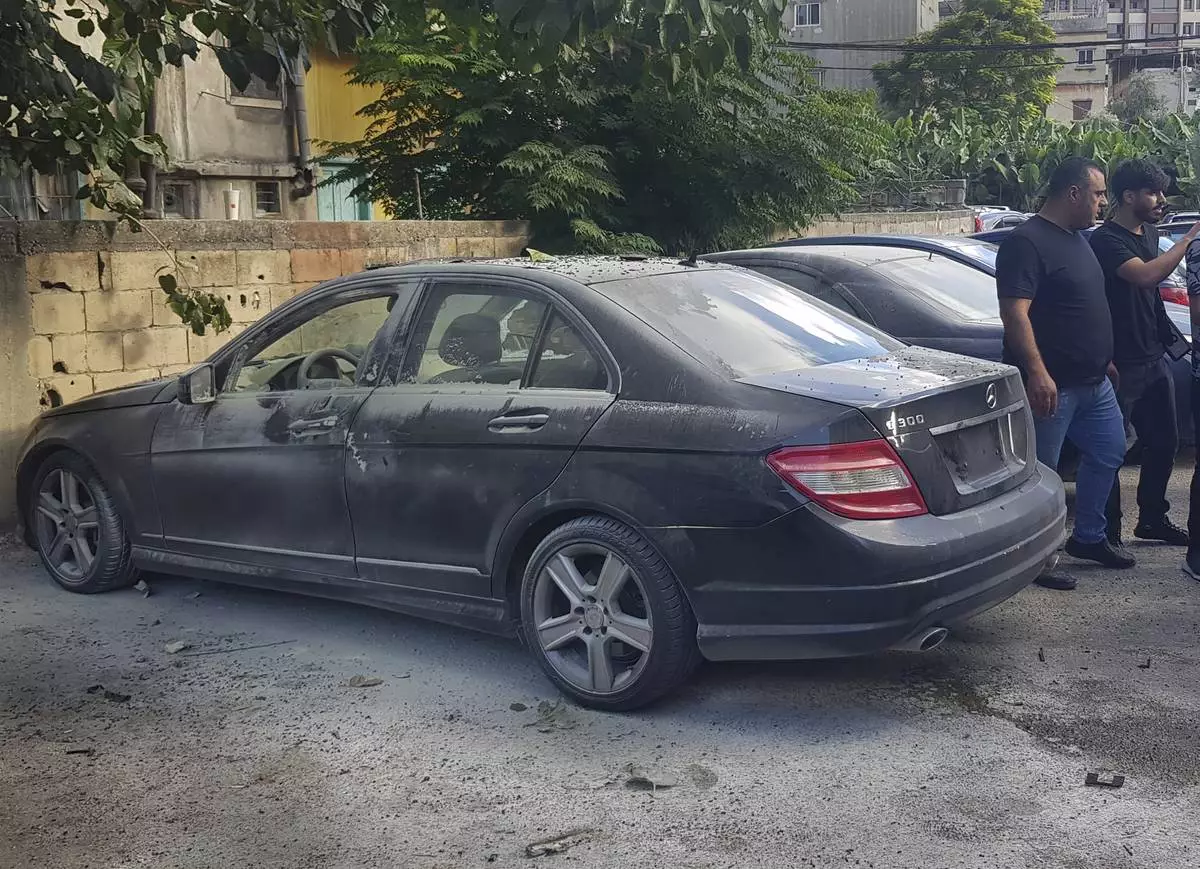
Lebanese security officers stand next of a partly damaged car after what is believed to be the result of a walkie-talkie exploding inside it, in the southern port city of Sidon, Lebanon, Wednesday, Sept. 18, 2024. (AP Photo/Mohammed Zaatari)
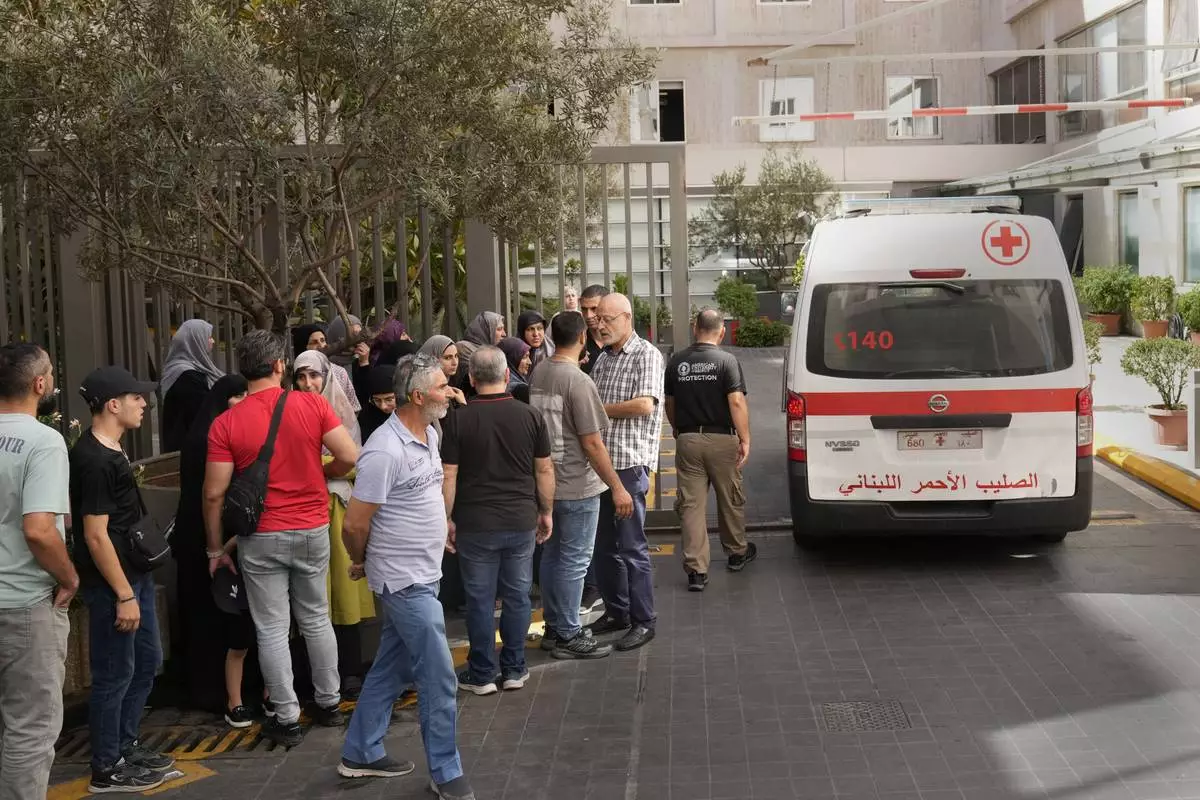
Lebanese Red Cross ambulance passes next of the families of victims who were injured on Monday by their exploding handheld pagers, at the emergency entrance of the American University hospital, in Beirut, Lebanon, Wednesday, Sept. 18, 2024. (AP Photo/Hussein Malla)
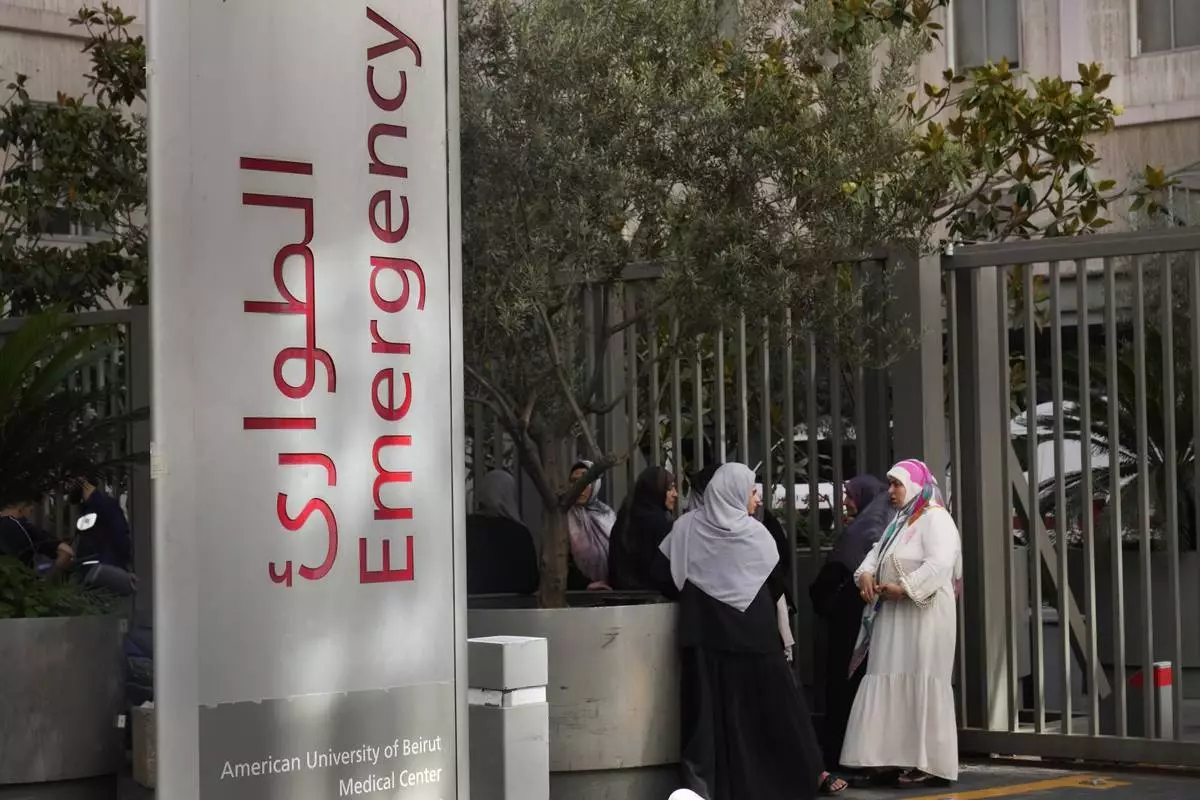
Families of victims who were injured on Monday by their exploding handheld pagers, wait at the emergency entrance of the American University hospital, in Beirut, Lebanon, Wednesday, Sept. 18, 2024. (AP Photo/Hussein Malla)
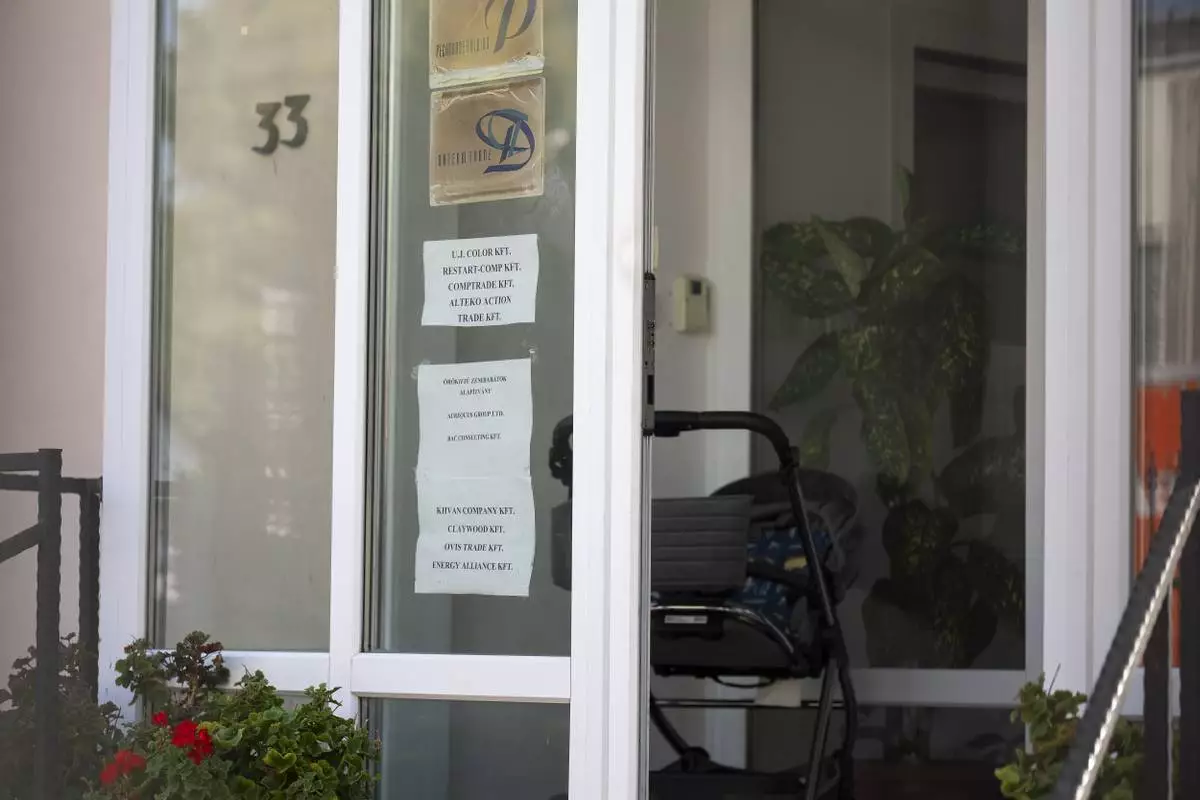
This shows a sing featuring the names of several companies on the door of a house where a Hungarian company that allegedly manufactured pagers that exploded in Lebanon and Syria is headquartered in Budapest Wednesday, Sept. 18, 2024. (AP Photo/Denes Erdos)
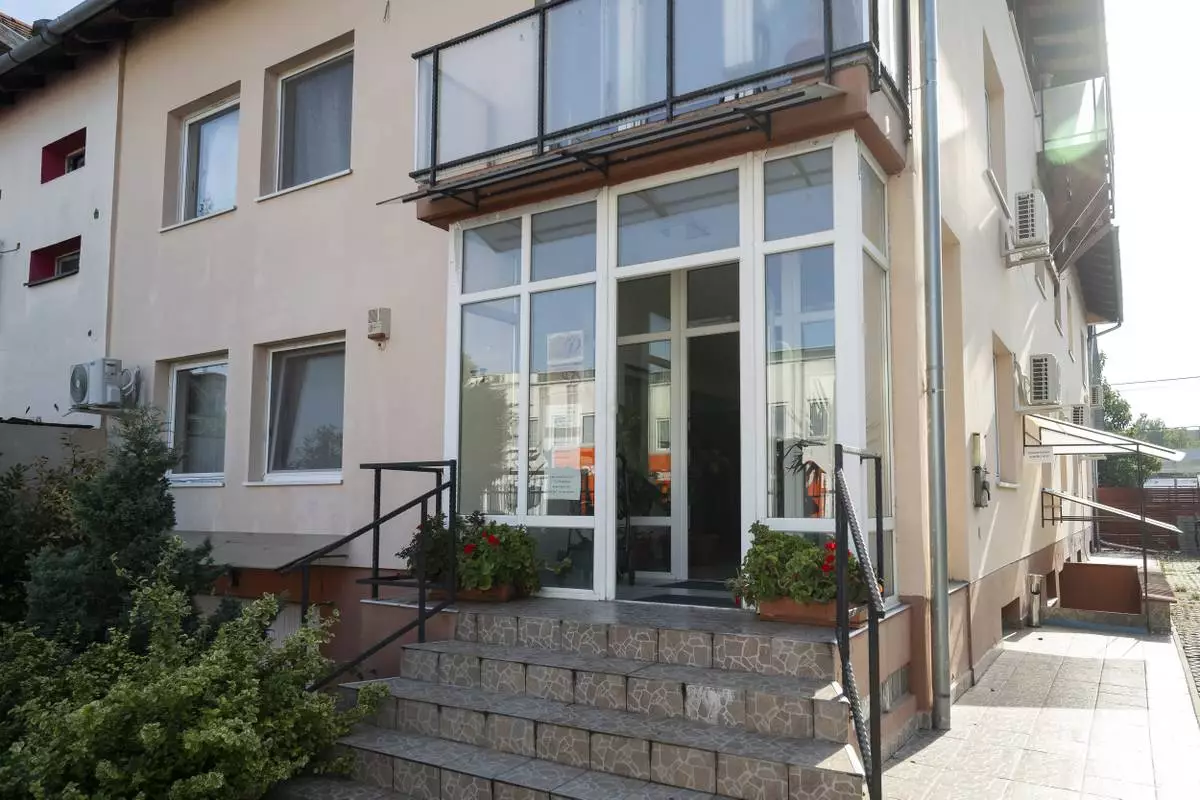
This photo shows a door of a house where a Hungarian company that allegedly manufactured pagers that exploded in Lebanon and Syria is headquartered in Budapest Wednesday, Sept. 18, 2024. (AP Photo/Denes Erdos)
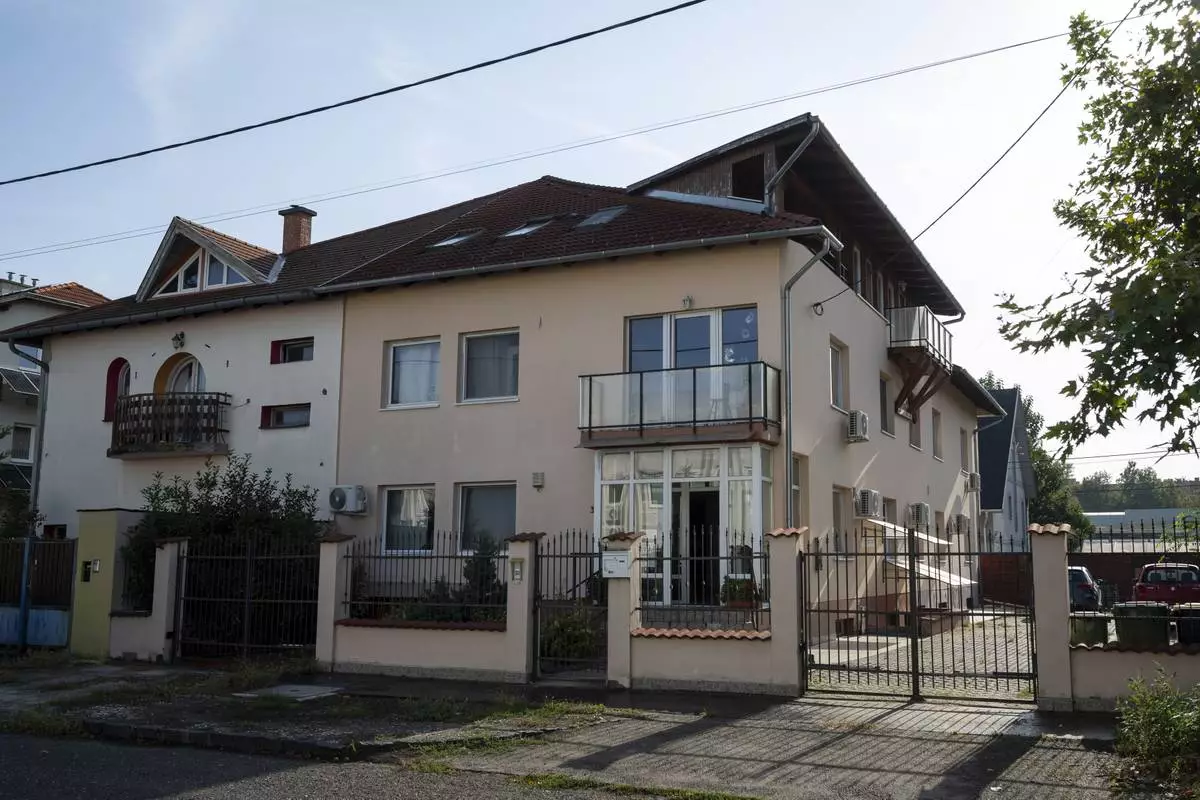
This photo shows a house where a Hungarian company that allegedly manufactured pagers that exploded in Lebanon and Syria, is headquartered in Budapest Wednesday, Sept. 18, 2024. (AP Photo/Denes Erdos)
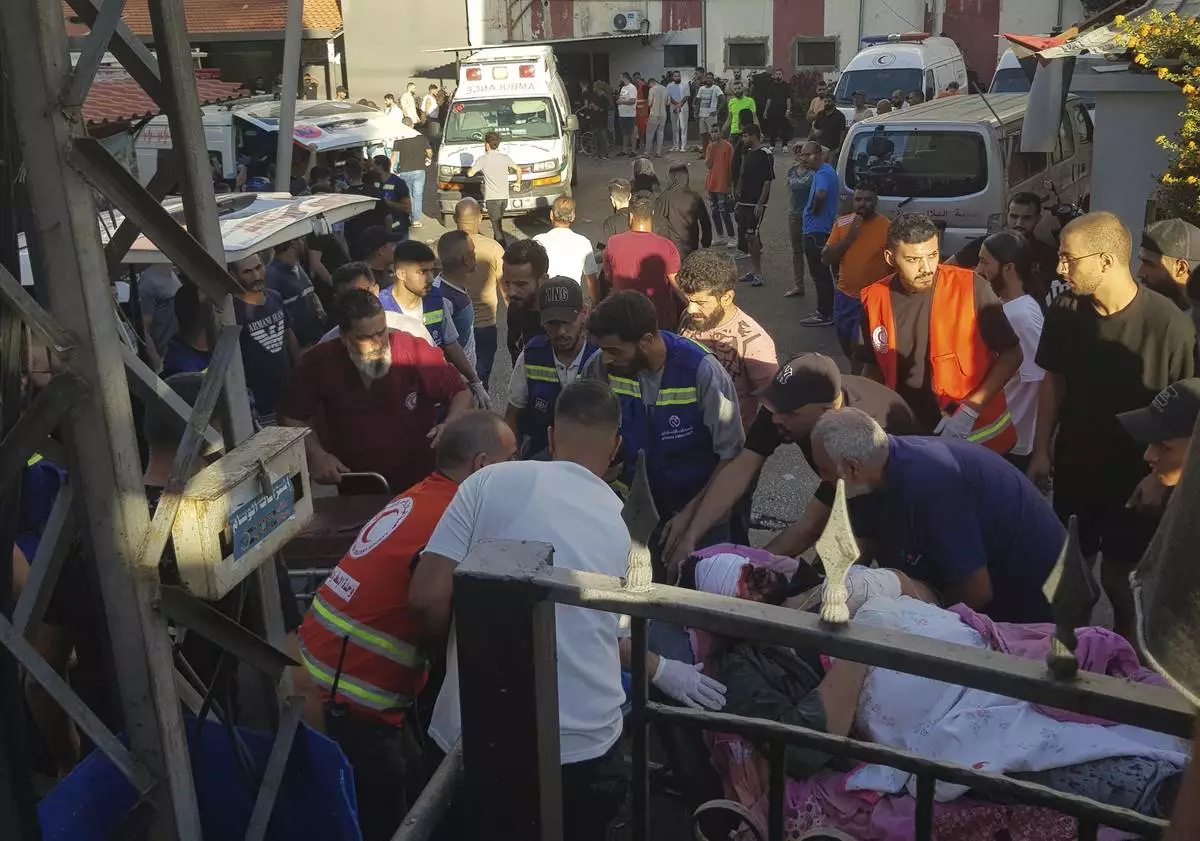
Civil Defense first-responders carry a man who was wounded after his handheld pager exploded, in the southern port city of Sidon, Lebanon, Tuesday, Sept. 17, 2024.(AP Photo)

Hsu Ching-kuang, chairman of Apollo Gold, talks about the Taiwan company's communication products at the headquarters in New Taipei City, Taiwan Wednesday, Sept. 18, 2024. (AP Photo/Johnson Lai)
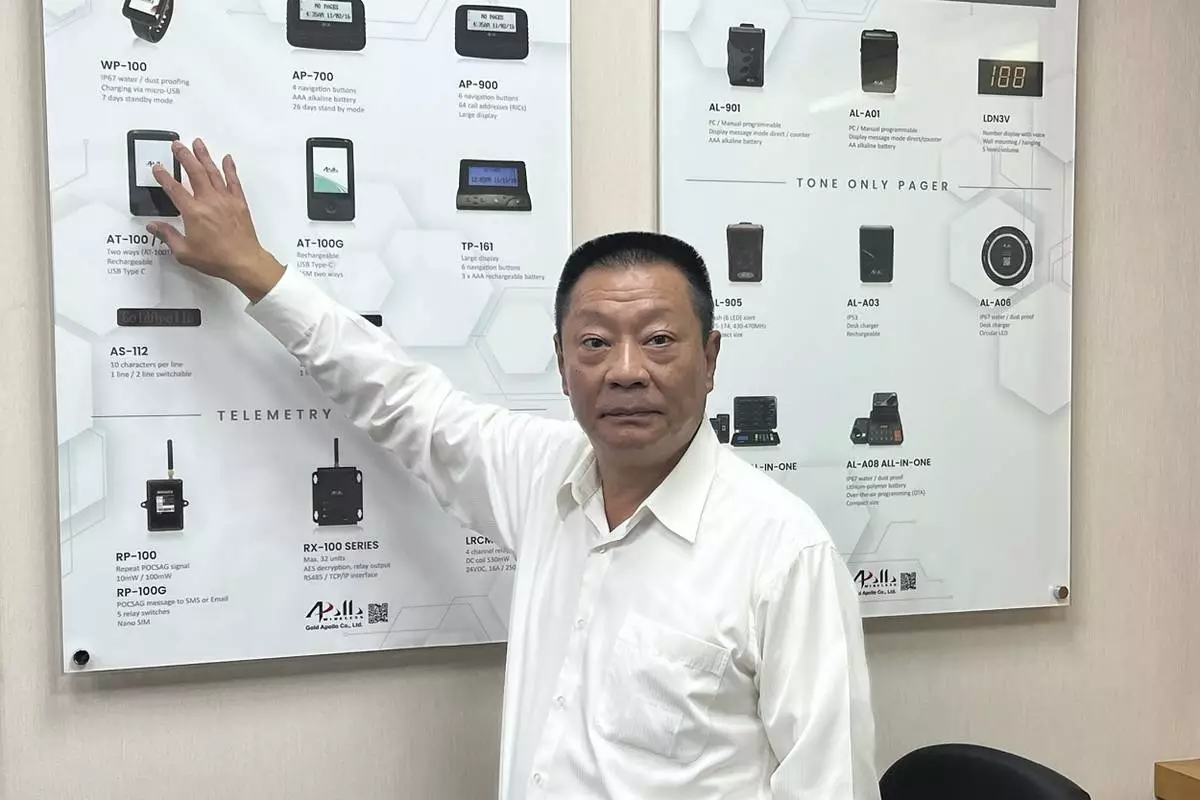
Hsu Ching-kuang, chairman of Apollo Gold, talks about the Taiwan company's communication products at the headquarters in New Taipei City, Taiwan Wednesday, Sept. 18, 2024. (AP Photo/Johnson Lai)
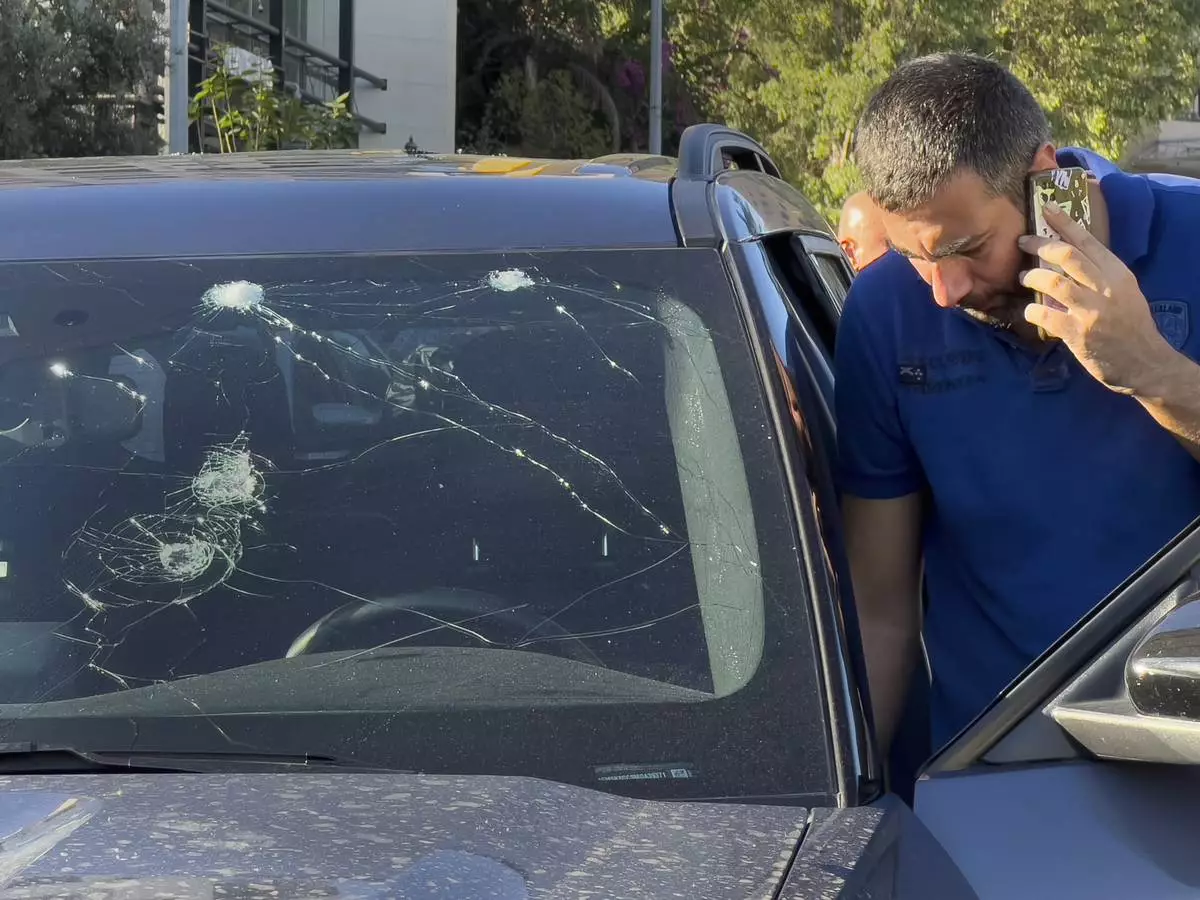
A police officer inspects a car in which a hand-held pager exploded, in Beirut, Lebanon, Tuesday, Sept. 17, 2024. (AP Photo/Hussein Malla)
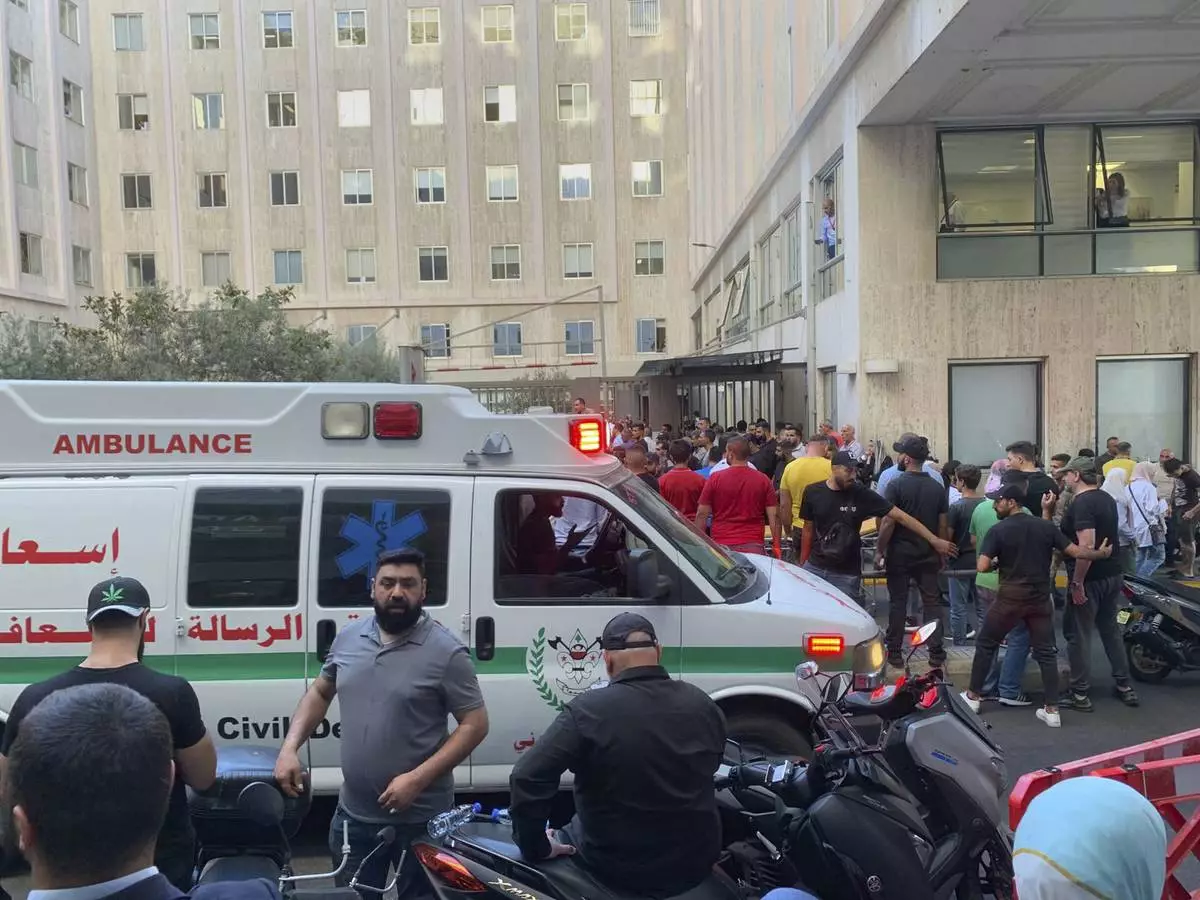
People gather outside the American University hospital after the arrival of several men who were wounded by exploded handheld pagers, in Beirut, Lebanon, Tuesday, Sept. 17, 2024. (AP Photo/Bassam Masri)
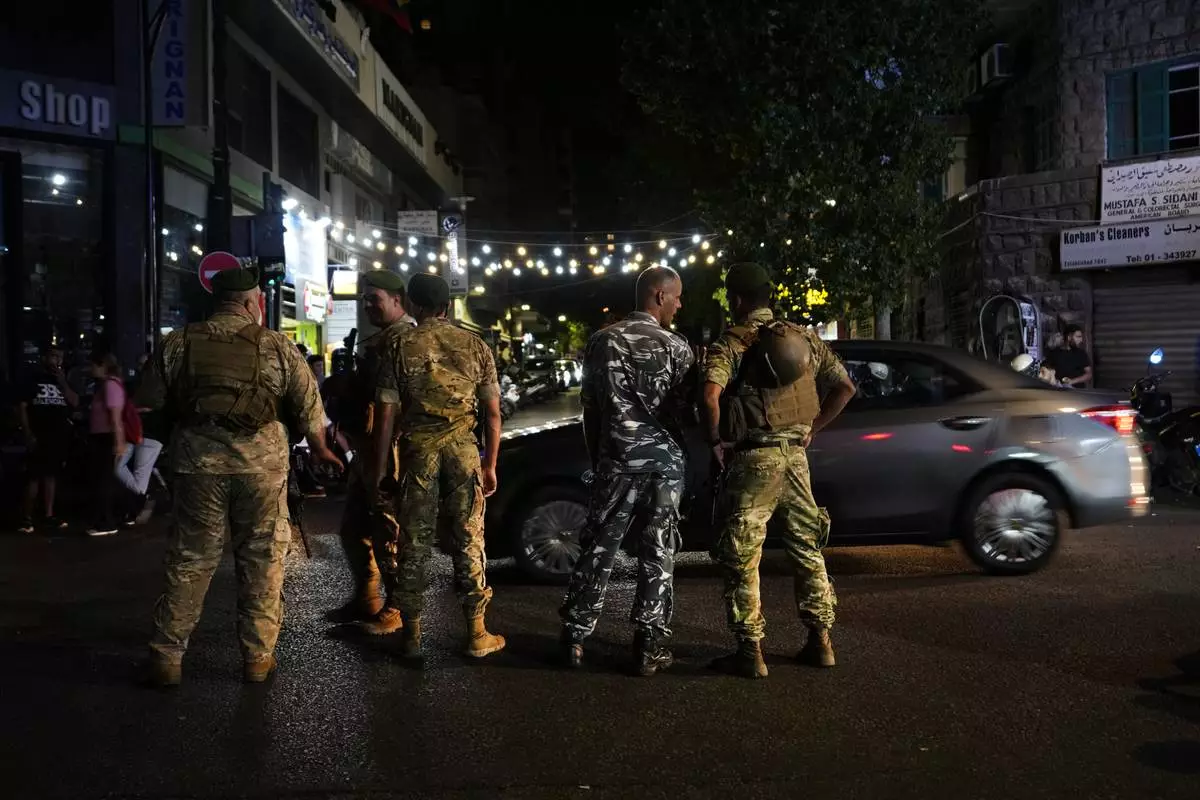
Lebanese soldiers stand guard at a street that leads to the American University hospital where they bring wounded people whose handheld pager exploded, in Beirut, Lebanon, Tuesday, Sept. 17, 2024. (AP Photo/Hassan Ammar)


